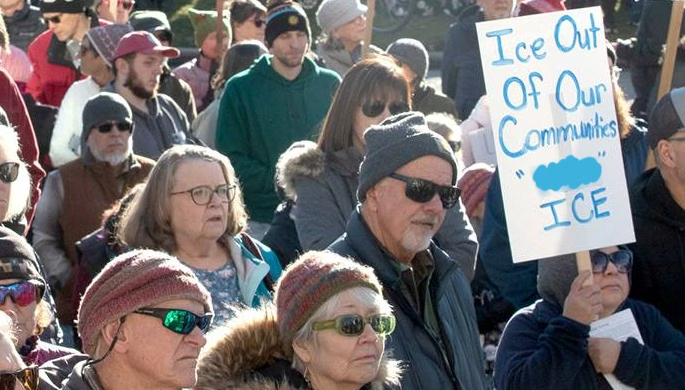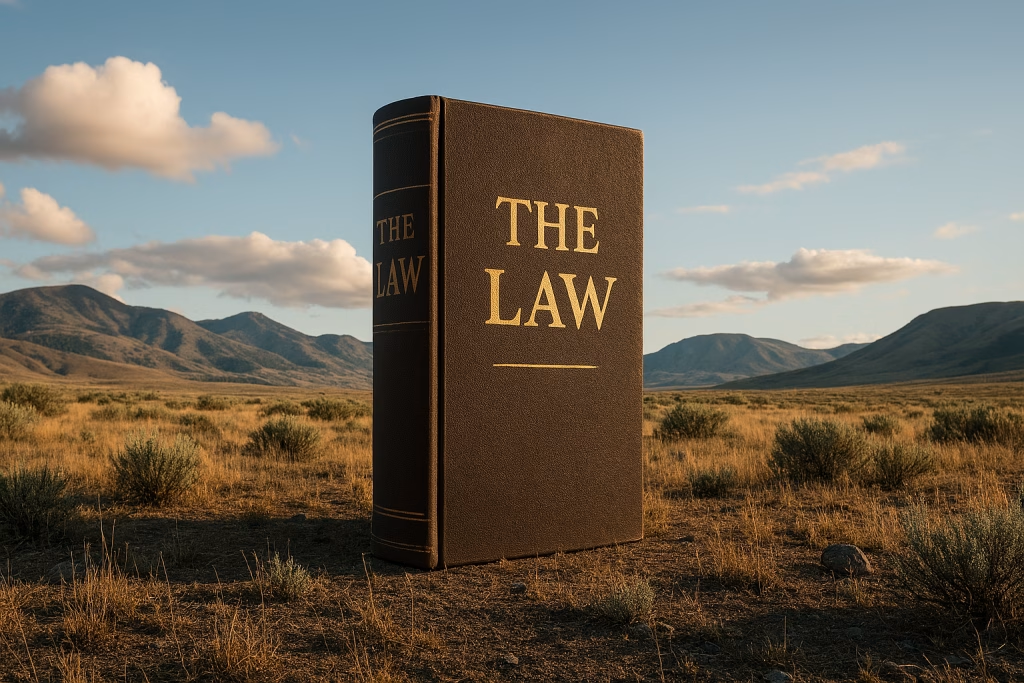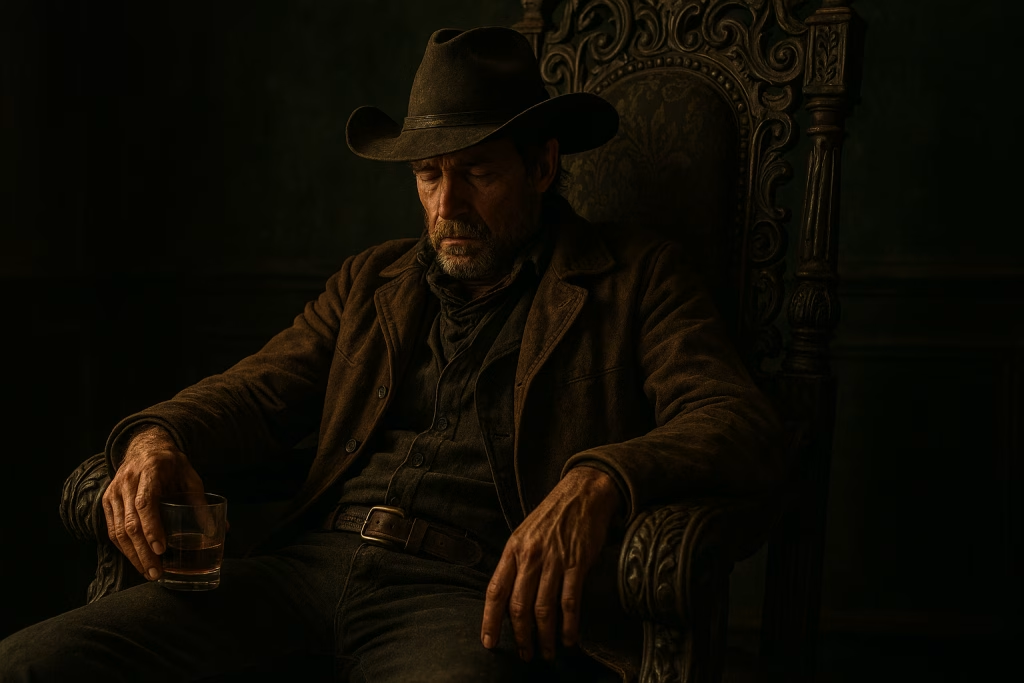Earlier this week, a man identifying as a transgender woman attacked a Catholic school, injuring more than a dozen and killing two children. This was only the latest horrific assault by a transgender-identifying individual, and it prompted discussion on social media about how to prevent such tragedies in the future.
Democrats like Gov. Gavin Newsom of California and Mayor Jacob Frey of Minneapolis predictably called for banning guns, while mocking the prayers of Christians, including the Catholic schoolchildren who were gunned down.
Ghouls.
Former Republican congressman Trey Gowdy, who moved to Fox News after a career of all talk and no action, blamed “white males with guns” for the problem.
Pro–Second Amendment conservatives were therefore already on edge, as we always are when high-profile shootings occur and the usual suspects push for gun control. It was no surprise, then, when some people reacted angrily to Sen. Tammy Nichols after she posed a question on Twitter Thursday:
Maybe there is a group that shouldn’t have access to guns?
Maybe certain chemical altering drugs should be considered?
Many of the reactions were disingenuous, as if one of Idaho’s strongest Second Amendment supporters had suddenly transformed into a Newsom clone overnight. Nichols clarified that her post wasn’t about gun control, but about mind-altering drugs:
I want to clarify that my post below on the Minneapolis shooting isn’t about gun control
I’m targeting access regarding our youth and mind-altering drugs (e.g., SSRIs) due to mental health stats, not bans. No red flag push! Naysayers please chill.
But do leave solutions below.
This got me thinking about the nature of the Second Amendment that we conservatives hold so dear. Years ago, I wrote about the virtue of firearms: that they bring civilization to chaos, equalize defenders with aggressors, and serve as tools for good in the hands of moral men:
It is that hand, attached to a person with a mind, a conscience, and moral agency, that determines if it is to be used for good or for evil. It is not the gun that killed innocent people in Parkland or Sandy Hook that was evil, but the young men who decided to use those guns to commit murder. On the other hand, the gun used by a man in defense of his family, an event that happens nearly every day, is not morally good, but is rather a tool in the hands of a moral man. It is for this reason, however, that the gun has traditionally been a symbol of the inalienable rights of all men and women.
It’s easy to forget that man in a state of nature is wild and barbaric, and that it is not laws or philosophy that create order out of chaos, but men with the capacity to do violence. As German author and World War I veteran Ernst Jünger once put it:
Long periods of peace and quiet favor certain optical illusions. Among them is the assumption that the invulnerability of the home is founded upon the constitution and safeguarded by it. In reality, it rests upon the father of the family who, accompanied by his sons, appears with the ax on the threshold of his dwelling.
Yet all this begs the question: What about those who use firearms to prey on the innocent, who bring chaos to order, who are not moral men?
This is a dangerous topic to broach in conservative company, as Sen. Nichols discovered, because activists who take a “no compromise” position on the Second Amendment see any such question as evidence of imminent gun control. But remember the unofficial motto of the Gem State Chronicle: “It is the mark of an educated mind to be able to entertain a thought without accepting it.”
Let’s examine the concept of the right to bear arms throughout history to see what we can learn today about protecting the innocent and vulnerable.
For many of us, the beginning and end of all conversations about firearms starts and ends with the last four words of the Second Amendment: “…shall not be infringed.” Other phrases, such as the Greek molṑn labé (meaning “come and take it,” attributed to King Leonidas of Sparta) and “from my cold dead hands,” also enter the conversation.
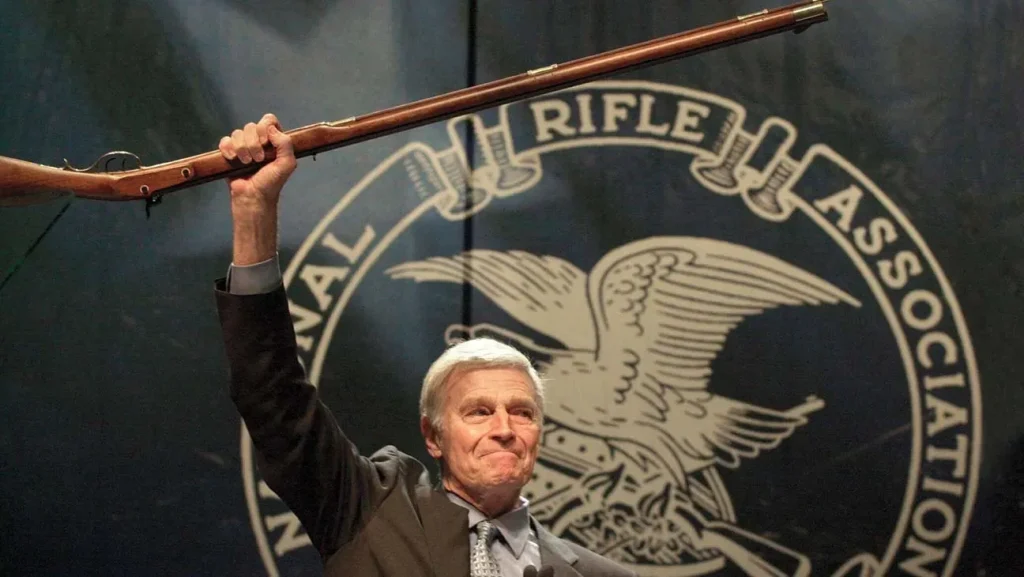
A few months ago, Idaho Second Amendment Alliance (ISAA) president Greg Pruett took a seemingly unpopular position when he said on Twitter that illegal aliens had the same right to bear arms as American citizens. The basis of his position, as I understand it, is that self-defense is an inalienable right given by God, not by government, and therefore no government has the authority to deprive a person of that right.
While I respect the absolutist position, I’m not sure it has ever existed in practice. A few weeks ago, I watched the sentencing hearing for Bryan Kohberger, who brutally murdered four students at the University of Idaho in 2022. In the criminal justice system, a man convicted of a crime—either by pleading guilty or being found guilty unanimously by a jury—has his rights and liberties removed by armed agents of the state. He is bound, incarcerated, and many of his previous rights—freedom of movement, freedom of speech, the right to self-defense, the right to vote—are suspended.
We support this because we believe in law and order. If a person violates the law, then his rights—even though they were granted by God, not the state—are nullified.
Consider also the question of war. If a foreign army invaded the United States, and we captured enemy soldiers on our soil, confiscated their firearms, and locked them in POW camps, they could not expect a judge to rule that their Second Amendment rights had been violated. That would be absurd.
These are obviously extreme examples, but they illustrate that no right is absolute. God gives us inherent natural rights, but the sovereign people, from whom legitimate power flows, have granted government the authority to limit those rights in certain circumstances, such as following due process of law. This follows the scriptural provision laid out by the Apostle Paul in Romans 13 that the government “bears the sword” to carry out “God’s wrath on the wrongdoer”.
This is precisely why conservatives oppose red flag laws: they bypass due process, allowing a judge to take away a man’s property and his ability to defend himself based solely on accusations. It’s a violation, not only of the Fourth Amendment to the Constitution, but to natural law.
While Idaho is one of the many states that does not require a government permission slip to carry concealed firearms in public—thanks to the work of Pruett and ISAA—there are still limits. For example, Idaho Code § 18-3302B declares it unlawful for a person under the influence of drugs or alcohol to carry concealed.
The Idaho Legislature apparently decided in 1990 that drunk people carrying guns was a societal problem. It is therefore the law of the land, but is it morally and constitutionally right? What about open carrying while drunk, which does not appear to be addressed by the law?
What does that imply for people on SSRIs or transgender hormones? Could such persons be considered “under the influence” in the same manner as someone who has consumed too much alcohol? A related section of Idaho law—Idaho Code § 18-116—makes it clear that being drunk is no excuse for committing a crime, although a defendant may claim ignorance of intoxication:
…unless the defendant proves that he did not know that it was an intoxicating substance when he consumed, smoked, sniffed, injected or otherwise ingested the substance causing the condition.
What does this imply for minors who are prescribed drugs, hormones, or even surgeries in the name of transgenderism? Are they able to legally consent to irreversible procedures that may damage their bodies and minds to such an extent that shooters like the Minnesota attacker are becoming an epidemic?
In a scholarly paper for Marquette Law Review last year, author Mark Anthony Frassetto examined the history of laws attempting to separate drunkenness from firearms. The paper was written in response to another by F. Lee Francis, which argued against such laws as being antithetical to the original meaning of the Second Amendment.
Feel free to read both; my point is that this has long been a debated area. Indeed, conservatives often simply assert that the freedom to bear arms is a fundamental God-given right, and end the conversation there. My question (as it always is) is: why? How do we know? When did we discover this right? There isn’t an explicit Bible verse that says we have the right to bear arms, so where did the Founders get their ideas?
The Second Amendment was not written in a vacuum. The Federalists, who supported the new Constitution written at the Philadelphia Convention of 1787, did not believe a Bill of Rights was necessary. Issues such as free speech, freedom of the press, religion, bearing arms, and criminal justice were left for states to decide, not the national government. Yet the Anti-Federalists made ratification contingent on a Bill of Rights, fearing the national government would otherwise infringe on unwritten natural rights.
In this, the Anti-Federalists were proven correct. Look at other countries with the same basis in English common law—the United Kingdom, Canada, Australia—where firearms are mostly banned and authorities arrest elderly women for saying the wrong things on Facebook.
So where did the idea of the Second Amendment come from? Bearing arms has been inseparably linked to the concept of liberty in America from the start. The American Revolution began when General Thomas Gage, British military governor of the Massachusetts Bay Colony, sent soldiers to confiscate a cache of weapons collected by militiamen. He feared the weapons would be used against the government—and by attempting to seize them, he made that a self-fulfilling prophecy.
Even before that, bearing arms was considered the birthright of free men. In 1689, the Glorious Revolution ousted Catholic King James II in favor of his son-in-law, the Protestant King William. King James had attempted to confiscate guns from Protestants, fearing they would be used against him. Parliament made the right to bear arms explicit in the English Bill of Rights following James’ removal:
That the subjects which are Protestants may have arms for their defence suitable to their conditions and as allowed by law.
The philosophy of the Glorious Revolution was formalized by John Locke, who emphasized the natural rights to life, liberty, and property. If these are indeed natural rights, it logically follows that we have the right to defend them with whatever weapons we can. The right to bear arms is therefore a natural outgrowth of life, liberty, and property, which was later paraphrased by Thomas Jefferson as “life, liberty, and the pursuit of happiness” in the Declaration of Independence.
William Blackstone, the 18th-century jurist whose commentaries inspired the Founders, proclaimed that “having arms for their defence” was a fundamental right of British subjects. He also wrote that “due restrictions” were a component of that right, which could be a tough pill to swallow for those who believe gun control is a recent invention.
Whether such restrictions are necessary to prevent evil men from committing evil acts, or are the diktats of tyrants oppressing the good, is ultimately in the eye of the beholder. Even in antiquity, the right to defend oneself and one’s family was recognized as absolute. Roman philosopher Marcus Tullius Cicero wrote in his treatise on the duties of citizens:
If our lives are endangered by plots or violence or armed robbers or enemies, any and every method of protecting ourselves is morally right.
Going back even further, the Laws of Moses explicitly protected the right of self-defense:
If a thief is found breaking in and is struck so that he dies, there shall be no bloodguilt for him
Exodus 22:2 ESV
In his Two Treatises of Government, Locke paraphrased the passage from Exodus when he wrote:
This makes it lawful for a man to kill a thief, who has not in the least hurt him, nor declared any design upon his life.
Contrary to the approach common in blue states and in countries like the United Kingdom, which afford criminals more legal protections than their victims, historical tradition holds that by committing a crime, a person forfeits certain rights to life and liberty.
Clearly, the Founding Fathers were building on centuries of tradition when they recognized that Americans had a natural right to self-defense. Nevertheless, it took time for American law to catch up. Prior to the Civil War, the Bill of Rights only applied to the federal government. States could—and did—take actions that seem contrary to the Bill of Rights today, such as establishing state churches. The 14th Amendment, intended to ensure freed slaves were citizens with full rights, “incorporated” the Bill of Rights at the state level.
Even prior to that, however, there was a sense that the basic concept of the right to bear arms could not be infringed by state laws. In 1837, Georgia passed a law banning the sale and carrying of certain weapons, including pistols. Nine years later, the Georgia Supreme Court ruled in Nunn v. State that the blanket prohibition violated that right, though the state retained the authority to prohibit concealed carry.
Nevertheless, for much of the 19th and 20th centuries, legislatures and courts believed some level of gun regulation was permissible. The National Firearms Act of 1934 established nationwide regulation of certain types of guns in response to the gang wars of the Prohibition era. This was followed by the Gun Control Act of 1968, which imposed additional regulations, and the Firearm Owners Protection Act of 1986, which moderated some of its provisions.
It wasn’t until 2008, in District of Columbia v. Heller, that the Supreme Court held the Second Amendment applied to individual citizens of the United States. The Court followed this with McDonald v. City of Chicago in 2010, explicitly incorporating the Second Amendment to the states via the 14th Amendment. Finally, in 2022, the Court ruled in New York State Rifle & Pistol Association, Inc. v. Bruen that although states could require permits for carrying concealed firearms, they could not restrict such permits based on subjective criteria. Bruen established that any regulations on firearms must be firmly grounded in what Justice Brett Kavanaugh referred to in his concurrence as the “text, history, and tradition” of American law.
All this shows that the right to bear arms for self-defense stems from a long tradition of English jurisprudence and political philosophy, with roots in Roman law and even Scripture. We should be wary of restricting access to firearms for particular groups, as it is all too easy to fall down a slippery slope of gun control; however we must remember that the right has never been absolute or universal, as seen in the cases of felons or invading soldiers.
Where I believe the discussion following the heinous Minnesota shooting should go—and where I think Sen. Nichols was trying to steer it—is in addressing the epidemic of young people who are harming their bodies and minds, then taking out their anger on innocent people, especially children. While I support calls to eliminate gun-free zones—schools should not remain soft targets for criminals—I believe more must be done.
We need an open and honest conversation about both the transgender-industrial complex, which is propagandizing children to believe they were born in the wrong body and supplying the drugs and hormones that irreversibly alter them, and the psychotropic medications that children are being prescribed in large numbers today.
Is there a correlation between SSRIs and other drugs given to children and their propensity to embrace transgender identities? A recent study found that nearly 3.5% of Idaho youth ‘identify as transgender’:
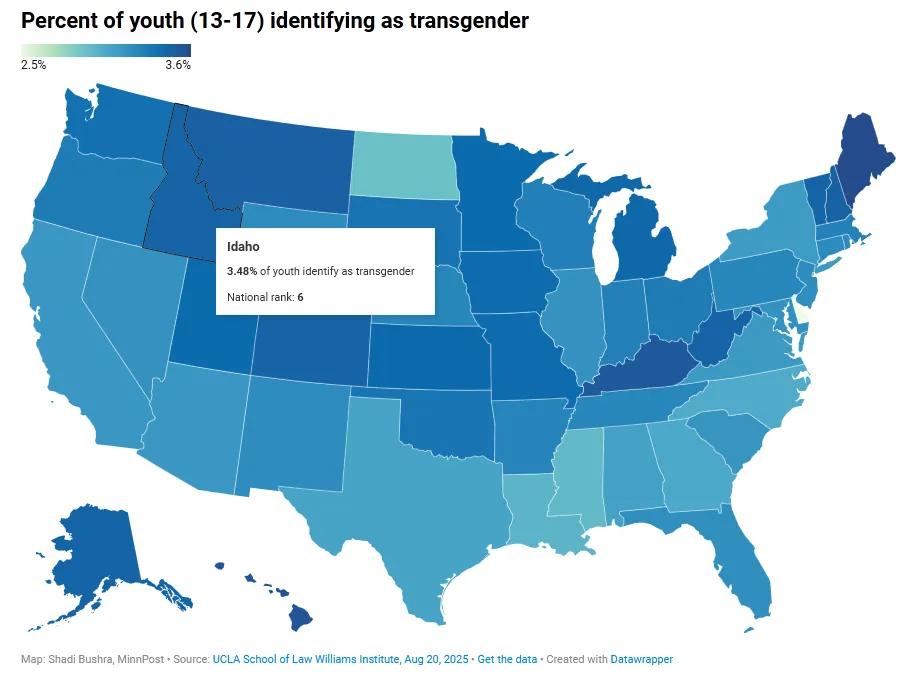
Where is this coming from? Leftists will argue that at least some children are simply born that way, but as conservatives, we reject the idea that people are born in the wrong body. Once LGBTQ+ indoctrination is removed from public schools, I suspect these numbers will drop.
Counselors, doctors, hospitals, and media personalities must be held accountable for the transgender epidemic. Chloe Cole’s parents were told she would surely commit suicide if they did not enable her mistaken belief that she was a boy—despite Cole later saying she was not suicidal. It was Cole’s testimony of her experience within the transgender industrial complex, and her subsequent detransition, that gave Idaho lawmakers the courage to pass House Bll 71 in 2023 despite vicious opposition from LGBTQ+ activists. Therapists who promote these beliefs should be held responsible for the consequences of their actions.
As conservative Christians, we do not believe that evil can ever be entirely eradicated from the human heart. We are fallen and fallible, and there will always be some who choose to harm others. But we can, at the very least, minimize the damage caused by a medical industry that is preying on children’s bodies and minds. According to a report by the Post Millennial published yesterday, the now-deceased shooter wrote in his manifesto that “gender and weed [messed] up my head.” Who is pushing for legalizing marijuana, prescribing psychotropic drugs to children, and convincing young people they need medical intervention to be themselves?
Beyond that, schools must become harder targets. Rep. Ted Hill has worked for two years on a bill allowing teachers to carry concealed firearms, giving school districts some oversight without granting them authority to ban guns. In 2024, his bill passed the House but was denied a hearing in Senate State Affairs by Sen. Jim Guthrie. This year, Hill attempted to include training requirements to get it through the Senate, but that was a bridge too far for conservatives. He’s said he will be back with a strong bill to arm teachers in 2026, and I hope he is successful.
We must also take seriously the threats made by those in the transgender movement who express intentions to harm innocent people. For instance, Lt. Gov. Peggy Flanagan of Minnesota—the same state where two children are now dead at the hands of a deranged transgender shooter—wore a shirt depicting a knife with the words “Protect Trans Kids.” Such signals should be treated as credible threats.
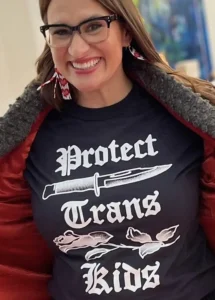
I do not believe the solution to this crisis is restricting firearms. Criminals and evil people will always find ways to acquire weapons, so potential victims must retain the means to defend themselves. But neither is the solution to arm schoolchildren and hope for the best. The epidemics of transgenderism and mass drugging of young people have created a dangerous situation, and now is the time to have honest, open conversations about how to address it—before we lose more children, either to bullets or irreversible damage to body, mind, and soul.
Gem State Chronicle is a reader-supported publication. To receive new posts and support my work, consider becoming a free or paid subscriber.
About Brian Almon
Brian Almon is the Editor of the Gem State Chronicle. He also serves as Chairman of the District 14 Republican Party and is a trustee of the Eagle Public Library Board. He lives with his wife and five children in Eagle.



